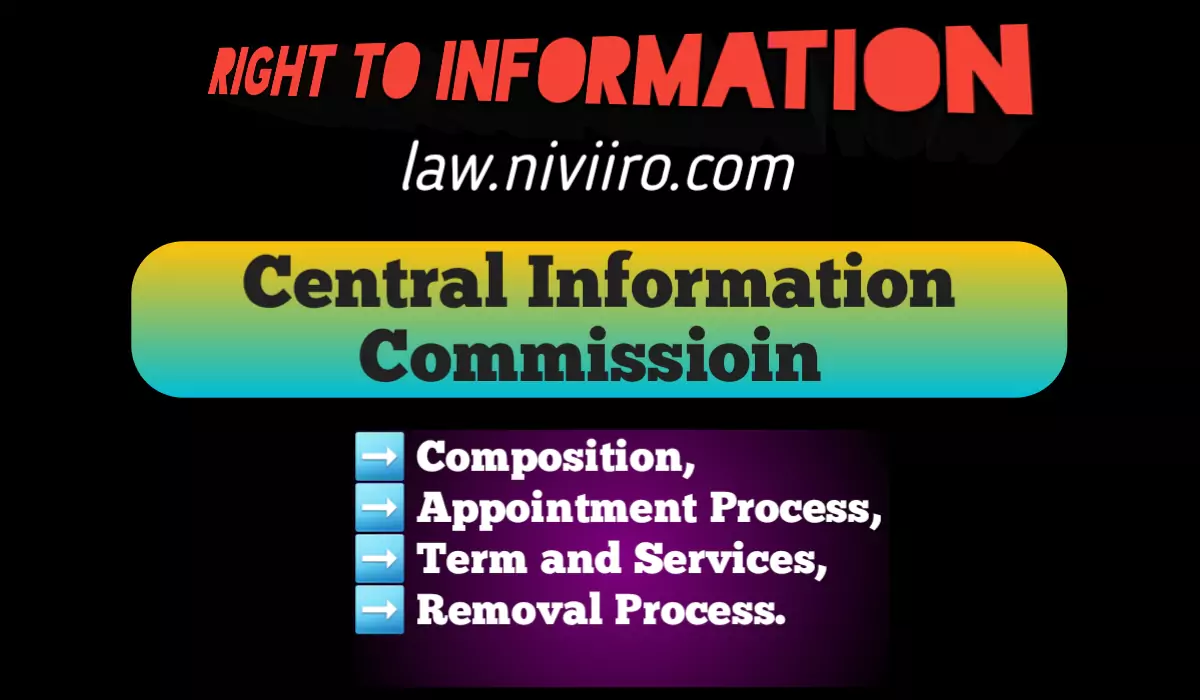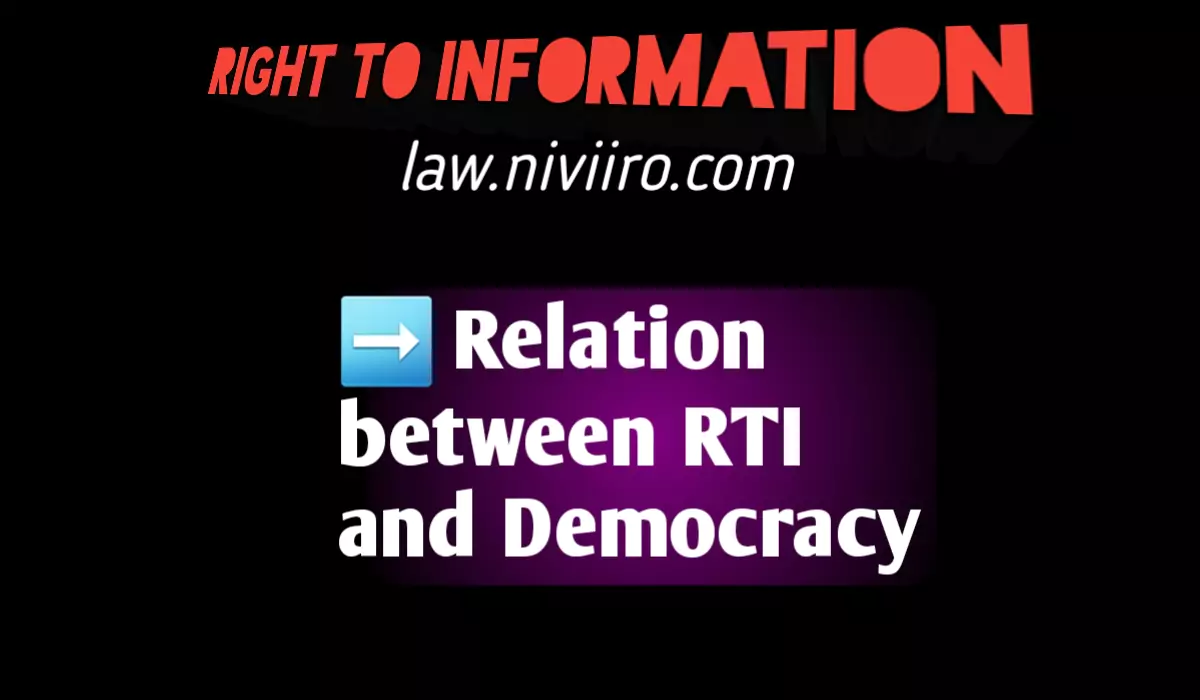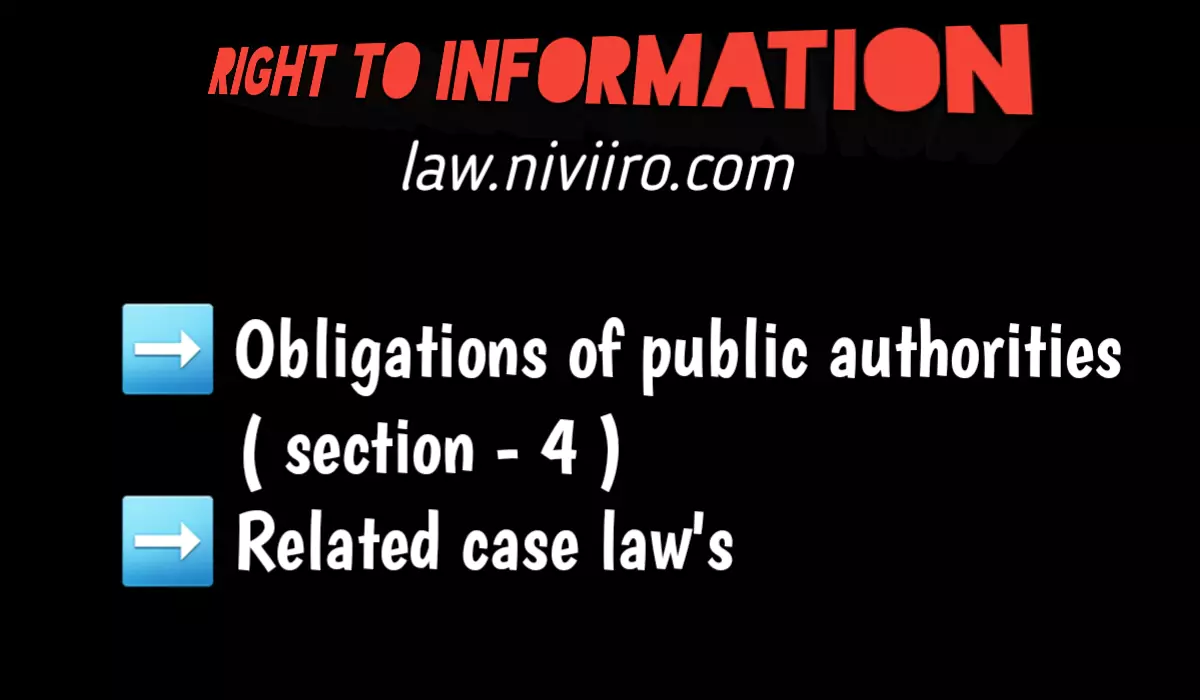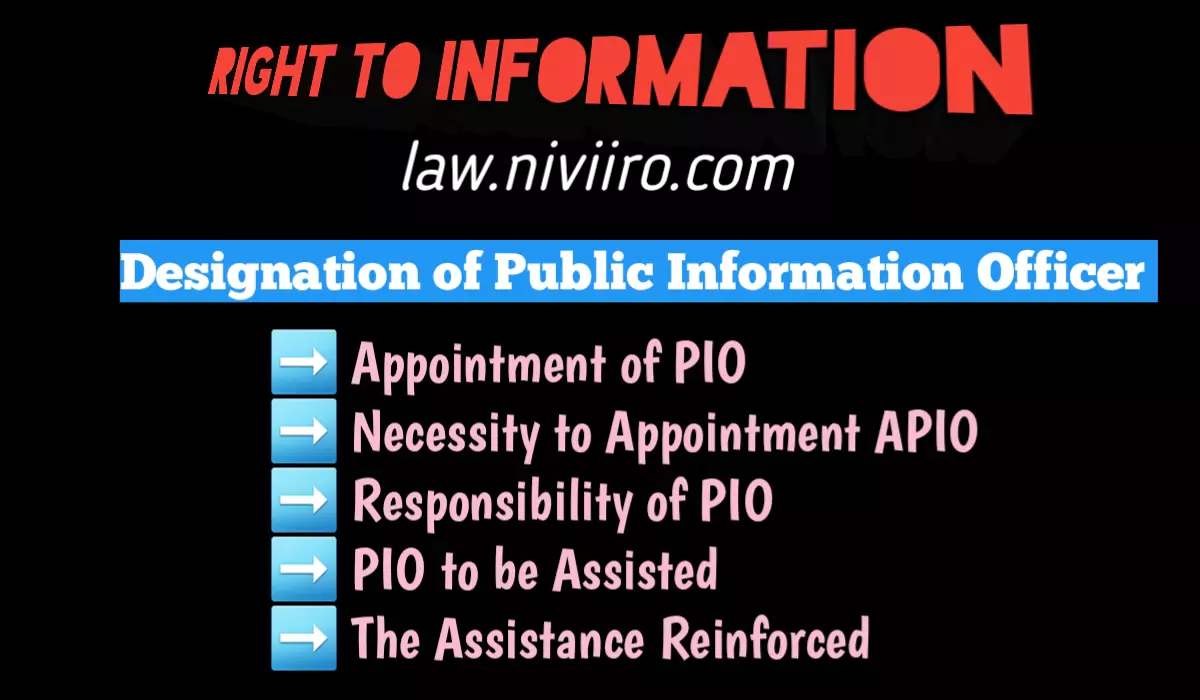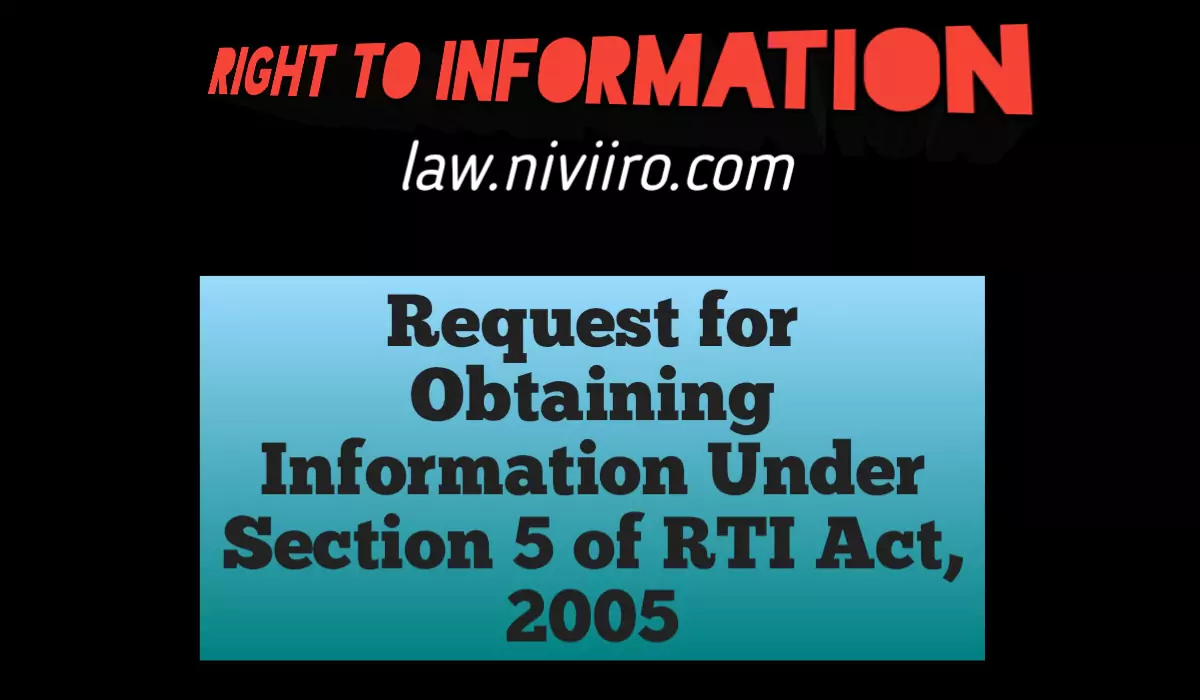The Central Information Commission (CIC) is an independent statutory body established under India’s Right to Information Act (RTI) on October 12, 2005. The CIC’s major goal is to enhance openness and accountability in the operation of the Central Government and its agencies by enabling citizens’ access to information stored by these institutions.
The provision regarding the Central Information Commission has been made under Section 12-14 ‘in Chapter-3 of the Right to Information Act.
Composition of Central Information Commission Under Section 12
Provision has been made in relation to the formation of the Central Commission under Section 12 (1) of the Right to Information Act. It will be formed by notification in the Central Government Gazette. The Central Information Commission has been constituted for the exercise of the powers obtained under this Act and for the discharge of its assigned functions.
Before coming to the specific provisions of Section 12, it would be relevant to say that the institution of information Commission created under the Act is the supreme body as far as the provisions of the statute are concerned. It is provided at two different levels, simultaneous and parallel, both at Centre and State levels. It is autonomous institution with an independent functioning under the Act. The highest decision making body under the Act is the ultimate level of disposal of applications received under the right to information. The decisions of this Commission are final and binding.
Section 12 (2) of the Act provides that the Central Information Commission shall consist of
(a) Central Information Commissioner and
(b) No more than ten Central Information Commissioners, as deemed necessary.
Process of Appointment
A specific procedure of appointment of the Central Chief Information Commissioner and the Central Information Commissioner has been envisaged to give it an objective and transparent look. The Committee to recommend such appointments consists of the Prime Minister as the Chairperson, the leader of Opposition and one Union Minister as members. By assimilating the leader of Opposition in the Committee, an attempt has been made to raise these posts above the political interests and it indicates the need of a political consensus regarding such appointments.
However, the ruling party has been allowed an upper hand over the opposition by raising the ratio of the Committee to two to one. If the decision is to be taken by the Committee by majority the leader of Opposition can just be reduced to the position of a helpless spectator. But keeping in view the senior status of the leader of Opposition his words and opinion normally carry weight and a consensus may be developed over the names to be recommended for such appointments, of course, out of the panel to be prepared by the Government. Thus the minimum level of decency may be maintained.
Section 12 (3) of the Act states that the Chief Information Commissioner and other Information Commissioners will be appointed by the President on the recommendation of a committee made up of (a) Prime Minister, who will be the chairman of the committee;
(b) Leader of the Opposition in the Lok Sabha;
(c) A Minister of Union Cabinet nominated by the Prime Minister.
Under Section 12 (4) of the Act, the functions of the Chief Information Commissioner have been explained. Accordingly, the Chief Information Commissioner, the Central Information Commissioner will general supervise, direct and manage the functions of the Central Information Commission.
Other Information Commissioners will assist the Chief Information Commissioner in the above works. Apart from the above, it has also been said that he can exercise all the powers exercised by the Chief Central Information Commission under this Act in respect of all such works etc. by the Chief Central Information Commission.
Section 12 (5) of the Act lays down the areas of specialization of the Chief Information Commissioner and other Commissioners. According to this, it is necessary to keep knowledge in the following areas-
(a) Have knowledge and experience of law;
(b) Have knowledge and experience in science and technology;
(c) Be a social worker;
(d) Have knowledge and experience of management;
(e) Have knowledge and experience of journalism; (f) Proficient in the art of public relations;
(g) Have extensive knowledge and experience governance by the administration.
Section 12 (6) of the Act prohibits the Chief Information Commissioner and other Deputy Commissioners that they will not be associated with –
(a) Must not be a member of parliament;
(b) Must not be a member of State or Union Territor Legislature;
(c) Should not hold any other office of profit;
(d) Should not belong to any political party;
(e) Not related to any business or profession;
Section 12 (7) of the Act provides that the headquarters the Central Information Commission will be in New Delhi of but the Central Information Commission can establish its office at any place in India, if desired. For office, it will have to take the opinion of the central government.
The Headquarter
It provide for opening of offices of the Central Information Commission in other parts of the country apart from its head quarters at Delhi. This is formal provision but it takes care of the future requirement of the people. If at any time in future the work requirement so demands, keeping in view the public convenience, the offices of the Central Information Commission may be established at the required places. Such requirement may actually arise with the growing use of the right provided under the Act and accordingly with due approval of the Central Government additional offices may be established as provided therein.
Term and service conditions of Chief Information Commissioner and entire commissioners (Sec. 13)
Each information officer assumes office for a period of five years from the date on which he assumes his office or until he attains the age of 65 years, whichever is earlier. He will not be eligible for reappointment. But the Information Commissioner will be eligible to be appointed as the Chief Information Commissioner after his post becomes vacant. If he is appointed as Chief Information Commissioner, he shall not hold the post for more than 5 years including the tenure of both the Information Commissioner and the Chief Information Commissioner.
Oath: The Chief Information Commissioner or other Information Commissioner takes an oath before the President or any person appointed by him for this purpose before assuming his office. The format of the oath is given in the First Schedule.
Resignation: The Chief Information Commissioner or other Information Commissioner can resign from his post at any time. The resignation letter must be signed by him in his handwriting which will be addressed to the President.
Salary and Allowances: Section 13(5) of the Act provides that the salary and allowances and other conditions of the Chief Information Commissioner shall be the same as those of the Chief Election Commissioner and those of the Information Commissioner shall be the same as those of the Election Commissioner.
If the Chief Information Commissioner or Information Commissioner is getting a pension for his prior service under the Central Government or State Government at the time of his appointment, then the amount of pension received by him will be reduced from his salary. The Central Government will make available to such officers and employees as are necessary for the efficient compliance of the functions of the Chief Information Commissioner or Information Commissioners. The salaries and allowances payable to these officers and employees and the terms and conditions of their service shall be such as may be prescribed.
Removal of Chief Information Commissioner or Information Commissioner According to Section 14 of the Act
Section 14 of the Right to Information Act 2005 provides for the procedure to remove Chief Information Commissioner and Information Commissioners from their posts and whereas Section 17 of the Act provides for the process of removal of the State Chief Information Commissioner and the State Information Commissioners. The basis of the said clauses is to strengthen the intention of the Legislature to provide independent status to the commissions.
Section 14(1) Subject to the provisions of sub-section (3), the Chief Information Commissioner or any Information Commissioner shall be removed from his office only by order of the President on the ground of proved misbehaviour or incapacity after the Supreme Court, on a reference made to it by the President, has, on inquiry, reported that the Chief Information Commissioner or any Information Commissioner, as the case may be, ought on such ground be removed.
Section 14(2) The President may suspend from office, and if deem necessary prohibit also from attending the office during inquiry, the Chief Information Commissióner or Information Commissioner in respect of whom a reference has been made to the Supreme Court under sub-section (1) until the President has. passed orders on receipt of the report of the Supreme Court on such reference.
Section 14(3) Notwithstanding anything contained in sub-section (1), the President may by order remove from office the Chief Information Commissioner or any Information Commissioner if the Chief Information Commissioner or a Information Commissioner, as the case may be
(a) is adjudged an insolvent; or
(b) has been convicted of an offence which, in the opinion of the President, involves moral turpitude; or
(c) engages during his term of office in any paid employment outside the duties of his office; or
(d) is, in the opinion of the President, unfit to continue in office by reason of infirmity of mind or body; or
(e) has acquired such financial or other interest as is likely to affect prejudicially his functions as the Chief Information Commissioner Information or a Commissioner.
When will the Chief Information Commissioner and Information Commissioner be deemed guilty of ‘misconduct’?
According to Section 14 (4) of the Act, the Chief Information Commissioner and the Information Commissioner will be guilty of misconduct on the following grounds,
- if he is in any way, concerned or interested in any contract or agreement made by or on behalf of the Government of India or
- participates in any way in the profit thereof or in any benefit or emolument arising therefrom otherwise than as a member and in common with the other members of an incorporated company.
Overall, the Central Information Commission plays a crucial role in ensuring that citizens have access to information held by the Central Government and its agencies, and that public officials are held accountable for their actions.
Related Post | Central Information Commission
- State Information Commission | Composition | Term and service | Removal
- Powers and functions of the Central Information Commission and State Information Commission
- Third Party Information Under RTI Act, 2005
- Meaning of RTI | Background | Objects
- Severability Under the RTI Act, 2005 | Section 10
- Relation between RTI and Corruption
- Grounds For Rejection to Access Information In Certain Cases under RTI Act, 2005
- Exemption From Disclosure of Information under RTI Act, 2005
References
- Commentary on The Right to Information Act by J. N. Barowalia, 2010
- Right To Information Law & Practice by R. K. Verma, 2010
- The RTI Story: Power to the People by Aruna Roy, 2018
- Right to Information by K. B. Rai, 2020













